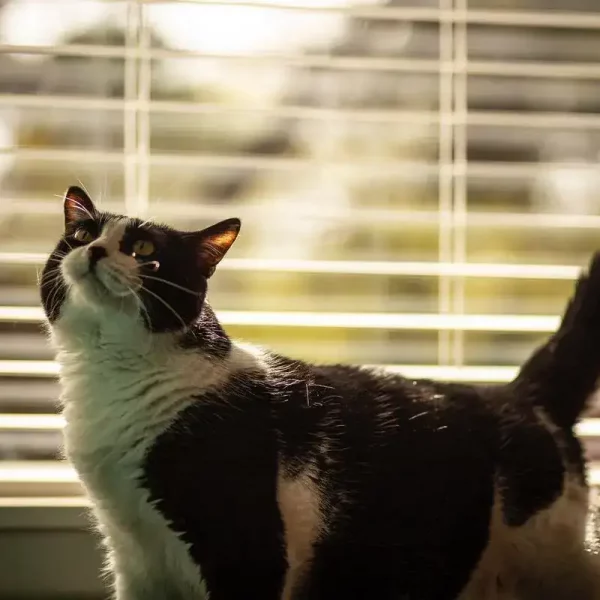Expecting a baby is a super exciting time for the whole family – and I repeat the whole family.
Since you have clicked on this post, you have probably noticed a few changes in your cat’s behavior since you have become pregnant.
Your cat might be more clingy than usual and prefers to stay at your side at all times.
Cats are incredibly observant and affectionate pets that are very sensitive to changes around them.
As highly social and domesticated animals, cats are amazing at picking up the smallest disturbances in their familiar environment.
And what greater change could happen to you than growing a whole human inside your belly?
Keep on reading to find out whether or not cats can pick up on pregnancy and how it influences their behavior.
In short, cats can become more clingy when you are pregnant, however, each cat is different and there is no guarantee that your cat will react in any way.
Signs Your Cat Knows You Are Pregnant
Pregnancy usually comes with a lot of changes to your body and your daily routine.
Every cat reacts differently to those changes and while many won’t change their behavior drastically, others might experience one or several of the following signs.

Clingyness
An increase in affectionate behavior is commonly seen in cats that live with a pregnant owner.
They can become very clingy and may even refuse to leave your side.
Even following you to the bathroom could become a new habit (if it isn’t one already).
Some cats start grooming their owner and attempt to comfort them, especially during rough patches.
While this is totally normal and understandable behavior, it can also turn into protectiveness which I will talk more about below.
Sometimes, pregnant women simply perceive their cats to be more clingy since they spent more time resting on the couch themselves.
If you get yourself into a comfortable position more often, your cat might take advantage of that.
Protectiveness
An increase in protectiveness is totally normal and it’s sweet to see that your cat has your back when you become more vulnerable.
Your cat might start meowing more often and his overall alertness may increase.
However, some cats take their job very seriously which could lead to problems.
Blocking family members from approaching you or interacting with you can be difficult to deal with.
Territorial behavior can involve aggression which would definitely be a sign that your cat is not handling the changes well.
Although this sounds very scary, most cats just need some help to adjust to the changes.
Nervousness
Cats can definitely react negatively to changes in their daily routine and environment.
As I have mentioned before, clinginess is only one sign that your cat can display when you are pregnant.
Pregnancy comes with a lot of discomfort and when you are feeling unwell, it’s not unlikely that this might influence your cat’s behavior and well-being.
A 2019 study has shown that cats can mirror the stress levels of their owners.
Our results show that long-term stress hormone levels were synchronized between cats and humans, two different species sharing everyday life. This could not be explained by either physical activity or by the amount of training. Long-term stress levels are synchronized in cats and their owners
Depression and anxiety of the owner can have similar effects on cats which could lead to nervousness, fearfulness, or other behaviors.
Fear can also come with aggression that can be directed toward the owner and/or other people.
Destructiveness
It’s not unheard of that cats turn to destructive behaviors in times of uncertainty.
So if your cat suddenly starts chewing up furniture or shredding toilet paper, this might be a sign that your cat senses the pregnancy.
Your cat might also have accidents inside the home although he has been potty trained as a kitten.
Once the new routine with a baby has been established, these symptoms should subside for the most part.
Do Cats Know When You Are Pregnant?
Anecdotally, many women would confirm that cats know when you are pregnant and scientifically they could be able to sniff out the hormonal changes happening inside your body.
During your pregnancy, your body goes through a rollercoaster of hormones.
Besides estrogen, progesterone, prolactin, oxytocin, and relaxin, your body also produces human chorionic gonadotropin hormone (hCG) which is completely unique to pregnancy.
Cats have a far better sense of smell than we do and they can smell the slightest changes in our bodies.
For example, cats have been found to be able to detect high stress levels in humans.
Results indicate that the physiological processes associated with an acute psychological stress response produce changes in the volatile organic compounds emanating from breath and/or sweat that are detectable to cats. Cats can discriminate between human baseline and psychological stress condition odours
Body odor usually changes when you are pregnant and can become stronger so there is no reason not to believe that cats can sense when you are pregnant.
However just because your cat can pick up on the changes doesn’t mean that he understands that you are actually pregnant.
There is no way for us to tell if your cat is aware that this pregnancy will lead to a baby that will live with him after 9 months.
Besides the odor, there are other changes that might happen in your body or your life that your cat might be aware of.
During pregnancy, you might experience a lot of discomfort that could lead to you and your cat acting differently.
When you are unwell, your cat might want to spend more time with you to provide some comfort.
This could also mean that your daily routine changes and the length and/or frequency of walks might differ from day to day.
Cats are very sensitive to changes in routine and while some are not really bothered by it, others might not get used to their new life as easily.
Can Cats Sense Labor
There is no scientific evidence that suggests that cats can sense labor, however, they might notice the hormonal changes in your body right before delivery and may become more clingy and protective.
Many women have reported that their cats behave differently even a few days before delivery.
This is most likely due to the slight changes in your hormones which influence your scent.
Cats are able to sense oncoming seizures, insulin levels, and even cancer so believing that cats can sense labor isn’t farfetched.
When you get closer to labor, the contractions can leave you walking in an unusual way or force you into more comfortable positions that your cat is not used to.
You may also start groaning or becoming more agitated which all adds to the whole picture.
Any changes can trigger concern in your cat and he can definitely tell that something is happening.
Disclaimer: This blog post does not substitute veterinary attention and does not intend to do so. I am not a veterinarian or pet nutritionist. If your cat shows any sign of illness, call your vet.



Leave a Comment